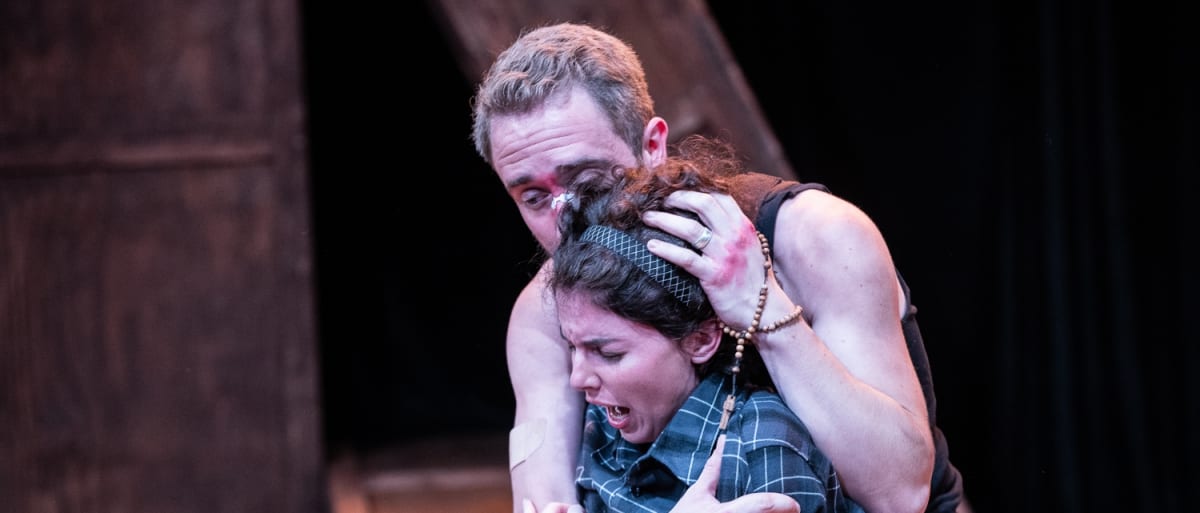With the spooky season in full swing, a modern, female-oriented take on Bram Stoker’s Dracula sounds like just the show to see. Set in the versatile space of Flamboyan Theater the Clemente Center, Patricia Lynn’s Your Invisible Corset is certainly an intriguing idea. It’s a thoroughly fun couple of hours in which eerie music dominates, lots of people scream, some more people faint, and more than once you may jump out of your seat at the inevitable, but nonetheless frightening, hooded spectre of Dracula who haunts the dark corners of stage. However, from a metaphorical perspective, this play has a lofty ambition which it simply does not live up to.
Lynn’s updated Dracula is set in Rhode Island in 2016 – a contentious year that should offer a hint as to the metaphors upon which the plot will be propped. It’s also wonderfully woman-centric. Where only women in the original Dracula served as damsels-in-distress to be rescued by the men, Lynn has converted all the characters to women save John Harker and Dracula himself. Van Helsing and Lucy’s many suitors are combined to create one character, Susan, a doctor at the local hospital who was married and recently divorced with Lucy. Renfield, the insane asylum patient, is merged with the mysterious “brides of Dracula” and becomes one complex character struggling between servitude and her own unhinged desires.
And then there’s Mina, who serves as our central character. The story is told through her eyes – she wakes up in the hospital, unable to remember what has happened, and slips in and out of hallucinations that seem too real to be imagined. Writer Patricia Lynn doubles as leading lady Mina, who is a prestigious professor, the wife of the swashbuckling John Harker (recently minted vampire killer), and the focus of Dracula’s attentions.
Mina tries to make sense of what’s happening to her – she doesn’t understand at first that, having been bitten by Dracula, she has established a telepathic link with him that allows him to invade her mind. John, the hero of Stoker’s tale, insists on keeping her in the dark on everything. He continues to hide information from her: that her friend Lucy has died; that John has killed far more vampires than she can imagine; he even refuses to update her on where he’s going and when, lying to her and even going so far as to handcuff her and attempt to sedate her to keep her “safe.” Her fear, anger, and frustration build to a breaking point. Meanwhile, her now-undead friend Lucy is appearing to her in dreams, enticing her with promises of freedom, of a man who will listen and who values women for all their strengths. Do you see a metaphor starting to form here?
Patricia Lynn and Emily Kitchens are particularly thrilling in their respective roles of Mina and Lucy. For her character as the undead, playful apparition slash child-killing vampire, Kitchens has mastered the fine line between alluring and creepy. Lynn, on the other hand, projects a fundamentally feminine frustration that, while narratively campy, is too real not to resonate with. Her portrayal of Mina as a successful professor who is finally accepting the patriarchy’s repression of her intelligence is sharp and well-played.
As eager as I am to seek out feminist originals or interpretations in both literature and theater (in which typically only the work of men are promoted and preserved), it was the clumsy feminist metaphors that I had the hardest time swallowing. Lynn’s message is that Dracula draws women in by promising to treat them with respect for their full potential – something that even a loving husband like John has trouble doing with his much more intelligent wife. But once he has them under his spell, he turns on them and controls them the way that every other man in their lives had tried to. In an interesting concept, without a doubt. It challenges the original plot of Dracula, which hinges on the idea of women as beings that need to be protected by strong men. But in production, the idea feels sloppy and overdone, as if all the pieces didn’t quite come together.
That being said, the show is still fun, and its cast do an admirable job in reinterpretations of classic characters. Your Invisible Corset is a fittingly spooky and overall enjoyable production.

